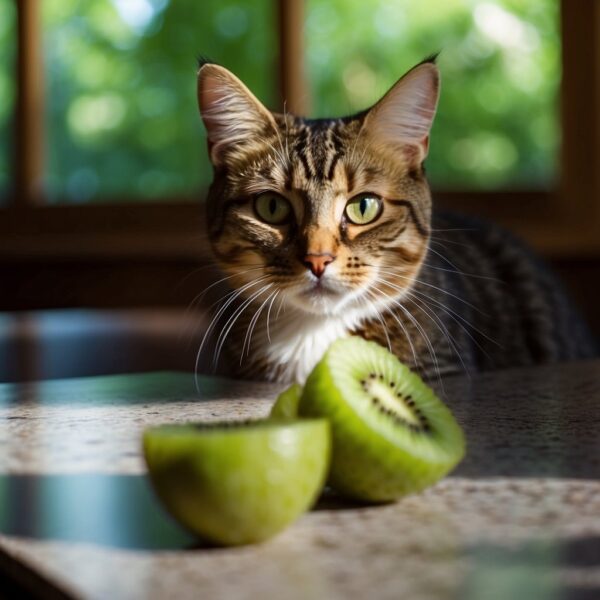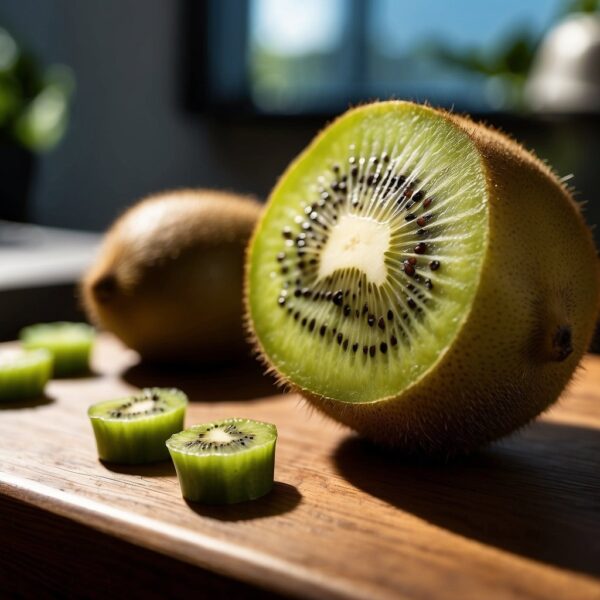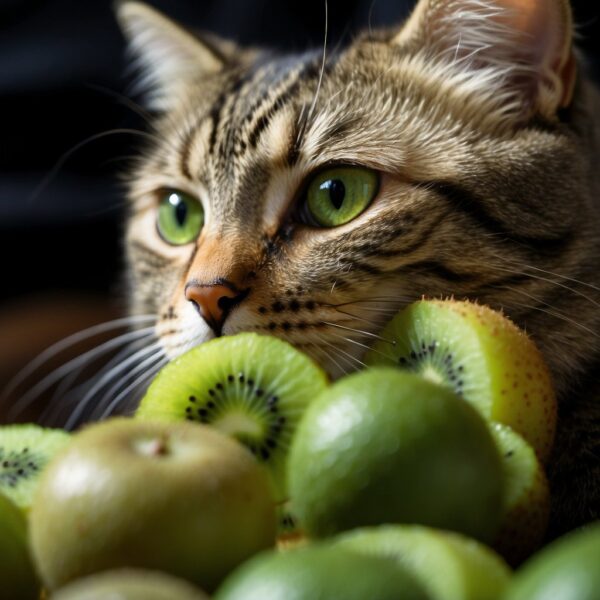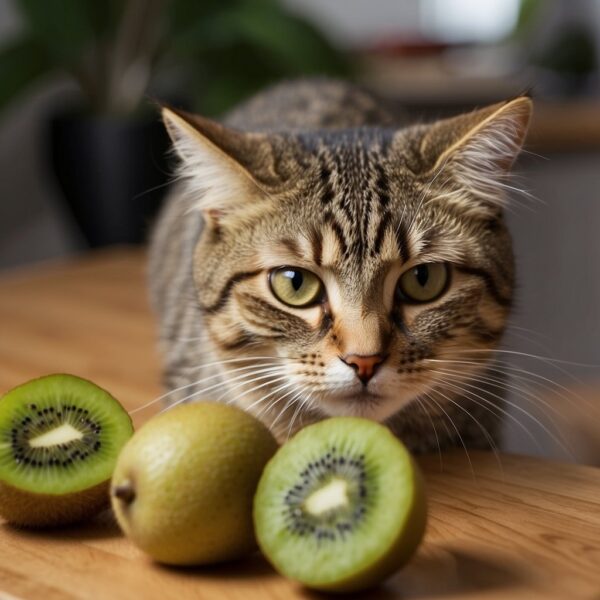
Cats Eating Kiwi Fruit is Safe in Moderation
Cat parents might wonder if they can offer their ca something different. Can cats eat sweet and tart kiwi fruit? Kiwi is known to be non-toxic to cats and does contain several nutrients that may be beneficial in small quantities. As a fruit, kiwi offers a high water content and an assortment of vitamins, including vitamin C and E, along with a small amount of potassium.
While kiwi is safe for cats to consume, it is essential to remember that it should only be offered in moderation. The feline digestive system is not designed to process large amounts of plant-based food, so kiwi should never constitute a significant part of a cat’s diet. It is best used as an occasional treat, rather than a dietary staple. Before introducing kiwi or any new food into a cat’s diet, consulting with a veterinarian can provide guidance tailored to the specific needs of the individual pet.
Key Takeaways
- Kiwi is safe for cats in small amounts, but it should not replace meat in their diet.
- The fruit provides hydration and beneficial nutrients like vitamins C and E.
- Always consult a veterinarian before adding new food to a cat’s diet.

Nutritional Profile of Kiwi
Kiwi features a rich nutritional profile that offers a range of vitamins, minerals, and dietary fiber. It is considered a healthy food choice due to its composition of essential nutrients and its relatively low calorie and sugar content.
Vitamins and Minerals in Kiwi
Kiwi is notably high in vitamin C, a powerful antioxidant that is essential for immune system function and skin health. Here’s a brief overview of the key vitamins and minerals found in kiwi:
- Vitamin C: Provides much more than the daily recommended value in one fruit.
- Vitamin K: Essential for blood clotting and bone health.
- Vitamin E: Contributes to cellular health and acts as an antioxidant.
- Potassium: A mineral that’s necessary for heart, kidneys, and other organ systems.
- Folate: Important for cell division and producing DNA.
- Antioxidants: Kiwi contains various antioxidants, such as lutein and zeaxanthin, which support eye health.
These nutrients contribute to the overall nutritional benefits of kiwi, making it a valuable addition to a balanced diet.
Sugar Content and Calories
Despite its sweetness, kiwi is relatively low in calories and sugar, which makes it an appealing option for a nutritious snack. The sugar content should still be considered, especially when consuming kiwi in larger quantities. Here is a concise breakdown of the sugar and calorie content:
- Sugar: Kiwi contains natural sugars, which give it a sweet taste without adding excessive calories.
- Calories: One medium kiwi contains around 42 calories.
Moderation is key, as even natural sugars and calories can add up, potentially impacting overall health if consumed in large amounts.
Health Benefits of cats eating Kiwi
Kiwi offers several health benefits for cats, such as aiding their digestion, supporting the immune system, and contributing to skin and coat health due to its nutrient content.
Digestive Health Contributions
Kiwi is a fruit that contributes to a cat’s digestive health, primarily through its dietary fiber content. Fiber is beneficial for the digestive system, helping to maintain regular bowel movements and preventing constipation. Additionally, the hydration provided by the high water content in kiwi can ease the passage of stool through the intestines, further supporting digestive health.
Supporting the Immune System
The presence of vitamin C in kiwi can play a role in supporting a cat’s immune system. Even though cats produce their own vitamin C, the antioxidant properties of this vitamin can help protect their bodies from free radicals. It’s important to note that cats require only a tiny amount of vitamin C from their diet, as excessive amounts can cause issues.
Skin and Coat Health
Kiwi contains omega-3 fatty acids, which are essential for maintaining healthy skin and a glossy coat in cats. These fatty acids may help to reduce inflammatory skin conditions, improve the overall health of the cat’s skin, and contribute to a shiny and healthy-looking coat. However, the amount of omega-3s in kiwi is relatively small compared to other sources like fish oils.

Possible Risks of cats eating Kiwi
While kiwi is generally safe for cats to consume in moderation, certain risks can arise. Cat parents should be aware of potential allergic reactions, choking hazards, and gastrointestinal distress that may occur.
Allergic Reactions and Sensitivities to cats eating kiwi
Cats can, on rare occasions, exhibit allergic reactions to new foods, including kiwi. Symptoms of an allergic reaction may include itching, swelling, or difficulty breathing. Owners should introduce kiwi in very small amounts and observe their cat for any signs of allergies or sensitivities.
Choking Hazards and Indigestible Parts
Kiwi poses a choking hazard particularly due to its seeds and tough skin. It’s vital to remove the skin and ensure the fruit is cut into appropriately sized pieces to prevent choking. The seeds of the kiwi may also cause digestive upset, so they should be avoided.
Gastrointestinal Distress from cats eating kiwi
Cats primarily eat meat and may not handle the high fiber content in kiwi well, leading to gastrointestinal distress. Symptoms like diarrhea or vomiting can occur if a cat consumes too much kiwi. To minimize the risk of digestive upset, kiwi should be given in small, controlled portions.
Feeding Guidelines for Cats
When including fruits like kiwi in a cat’s diet, it’s important for cat parents to adhere to strict portion control and frequency limits to maintain the overall health and balance of the cat’s diet.
Appropriate Portion Sizes
Cats should consume kiwi in small pieces to avoid choking hazards and to make it easier for them to digest. The suitable serving size is no more than a few small pieces of kiwi, equivalent to one or two bites for an average-sized adult cat.
Frequency of Kiwi as a Treat
Kiwi should be given as an occasional treat, not a dietary staple. It’s recommended to offer kiwi or any other safe fruit treat to cats infrequently, perhaps once a week at most, to prevent digestive upset and nutritional imbalance.
Alternatives to Kiwi
If cat parents are seeking variety, other safe fruit options as treats include:
These should also be offered in moderation, mirroring the portion and frequency guidelines set for kiwi to ensure they remain a minor component of the cat’s overall diet.
When to Consult a Veterinarian
While kiwi is generally safe for cats when offered in moderation, there are specific scenarios where pet owners should promptly consult a veterinarian to ensure the cat’s health and safety.
Signs of Kiwi Intolerance or Toxicity
- Allergic Reactions: If a cat exhibits signs of an allergic reaction such as hives, swelling, or difficulty breathing after consuming kiwi, they should be taken to a vet immediately.
- Gastrointestinal Distress: Symptoms like vomiting, diarrhea, or lethargy could indicate intolerance or toxicity, signaling the need for veterinary attention.
Health Issues Related to Diet
- Existing Conditions: Cats with preexisting health problems, such as diabetes or liver issues, may require special dietary considerations. Kiwi, or any new food, should only be introduced after consulting a vet.
- Weight Management: Sudden changes in a cat’s diet, including the introduction of fruits like kiwi, could impact their weight. Guardians should seek a vet’s advice on proper portion sizes and dietary balance for their cats.
New Diet Inclusions for Kittens and Cats
- Kittens: Their nutritional needs are different from adult cats. Introducing new foods like kiwi should be discussed with a vet to tailor to a kitten’s growing needs.
- General Guidance: A veterinarian can provide guidance on integrating new foods into a cat’s diet, including portion sizes and frequency, to maintain optimal health.

Frequently Asked Questions about cats eating kiwi
When considering whether a cat can eat kiwi, it is important to assess the safety, potential hazards, and appropriate portions. This section addresses some of the common concerns cat parents may have.
Is kiwi fruit safe for cats to eat?
Kiwi is non-toxic to cats and can be offered as an occasional treat. However, moderation is key since cats primarily need a carnivorous diet.
Can consuming kiwi seeds harm cats?
Kiwi seeds are small and not known to be hazardous. They should pass through a cat’s digestion without issue in small quantities.
Is it okay for cats to eat the skin of a kiwi?
The skin of kiwi may hold residue of chemicals like pesticides, and it’s also tough for digestion. Therefore, it is better to remove the skin before offering kiwi to cats.
What fruits are safe for cats to eat?
Fruits like melon, blueberries, and sliced apples can be safe for cats in moderation. Each fruit should be introduced slowly to monitor for any adverse reactions.
Are there any fruits cats should avoid entirely?
Cats should avoid fruits high in citric acid like oranges, lemons, limes, and grapefruit. These can cause stomach upsets in cats.
Can kiwi juice be included in a cat’s diet?
Kiwi juice, especially store-bought, may contain added sugars and is not necessary in a cat’s diet. Fresh water is the best hydration for cats.